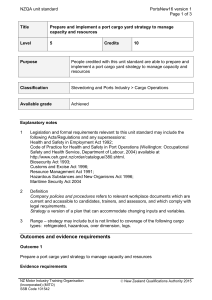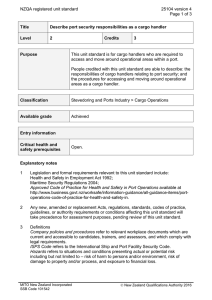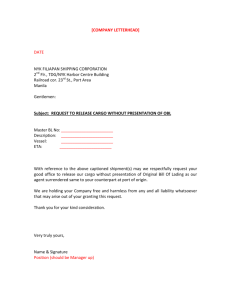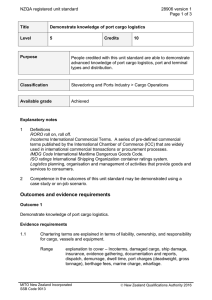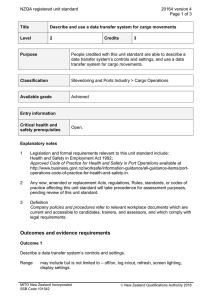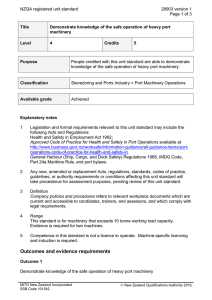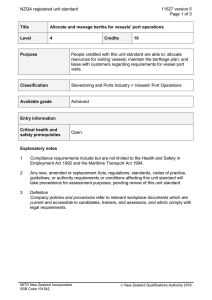New Port17
advertisement
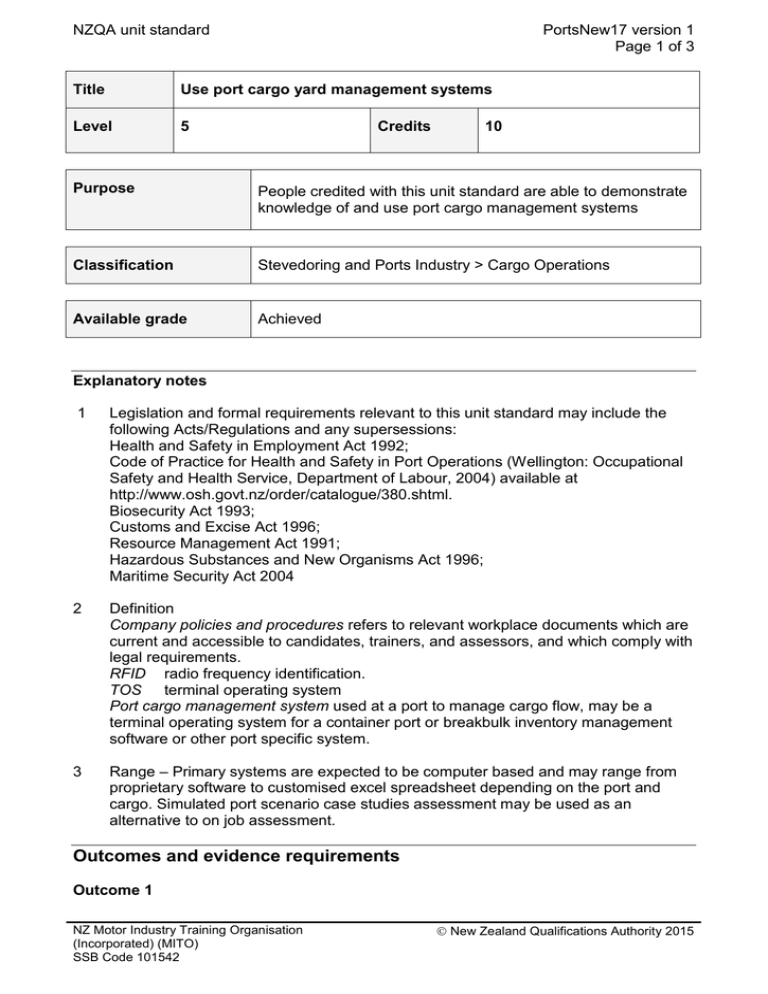
NZQA unit standard PortsNew17 version 1 Page 1 of 3 Title Use port cargo yard management systems Level 5 Credits 10 Purpose People credited with this unit standard are able to demonstrate knowledge of and use port cargo management systems Classification Stevedoring and Ports Industry > Cargo Operations Available grade Achieved Explanatory notes 1 Legislation and formal requirements relevant to this unit standard may include the following Acts/Regulations and any supersessions: Health and Safety in Employment Act 1992; Code of Practice for Health and Safety in Port Operations (Wellington: Occupational Safety and Health Service, Department of Labour, 2004) available at http://www.osh.govt.nz/order/catalogue/380.shtml. Biosecurity Act 1993; Customs and Excise Act 1996; Resource Management Act 1991; Hazardous Substances and New Organisms Act 1996; Maritime Security Act 2004 2 Definition Company policies and procedures refers to relevant workplace documents which are current and accessible to candidates, trainers, and assessors, and which comply with legal requirements. RFID radio frequency identification. TOS terminal operating system Port cargo management system used at a port to manage cargo flow, may be a terminal operating system for a container port or breakbulk inventory management software or other port specific system. 3 Range – Primary systems are expected to be computer based and may range from proprietary software to customised excel spreadsheet depending on the port and cargo. Simulated port scenario case studies assessment may be used as an alternative to on job assessment. Outcomes and evidence requirements Outcome 1 NZ Motor Industry Training Organisation (Incorporated) (MITO) SSB Code 101542 New Zealand Qualifications Authority 2015 NZQA unit standard PortsNew17 version 1 Page 2 of 3 Demonstrate knowledge of port cargo management systems Evidence requirements 1.1 Port cargo management system is described using a process flow diagram in accordance with company policies and procedures. 1.2 Port cargo management system components are identified and explained in terms of their function and implications on decision making for port cargo flow. Range 1.3 includes but is not limited to RFID systems. The management of port cargo system issues is explained in terms of problem solving and contingency planning in accordance with company policies and procedures. Range includes but is not limited to back up systems in the event of software or hardware failure (may be manual). Outcome 2 Use port cargo yard management systems Evidence requirements 2.1 Space optimisation requirements are considered and managed within the yard management system in accordance with company policies and procedures. Range includes but is not limited to – data interpretation, development of space plan, allocation of space. 2.2 Port plant resource availability and constraints are interpreted and managed within the yard management system in accordance with company policies and procedures. 2.3 Port person resource availability and constraints are interpreted and managed within the yard management system in accordance with company policies and procedures. 2.4 Cargo flow is interpreted and receival and delivery (R&D) rules set within the management system in accordance with company policies and procedures. Planned review date 31 December 2019 NZ Motor Industry Training Organisation (Incorporated) (MITO) SSB Code 101542 New Zealand Qualifications Authority 2015 NZQA unit standard PortsNew17 version 1 Page 3 of 3 Status information and last date for assessment for superseded versions Process Version Date Last Date for Assessment Registration 1 N/A Review Consent and Moderation Requirements (CMR) reference 0145 This CMR can be accessed at http://www.nzqa.govt.nz/framework/search/index.do. Please note Providers must be granted consent to assess against standards (accredited) by NZQA, before they can report credits from assessment against unit standards or deliver courses of study leading to that assessment. Industry Training Organisations must be granted consent to assess against standards by NZQA before they can register credits from assessment against unit standards. Providers and Industry Training Organisations, which have been granted consent and which are assessing against unit standards must engage with the moderation system that applies to those standards. Requirements for consent to assess and an outline of the moderation system that applies to this standard are outlined in the Consent and Moderation Requirements (CMRs). The CMR also includes useful information about special requirements for organisations wishing to develop education and training programmes, such as minimum qualifications for tutors and assessors, and special resource requirements. Comments on this unit standard Please contact the NZ Motor Industry Training Organisation (Incorporated) (MITO) info@mito.org.nz if you wish to suggest changes to the content of this unit standard. NZ Motor Industry Training Organisation (Incorporated) (MITO) SSB Code 101542 New Zealand Qualifications Authority 2015
